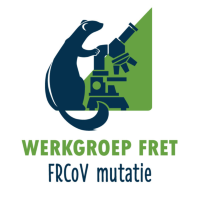More information

At the end of 2017, the workgroup was set up to investigate the origin and solution for the clinical picture we are dealing with. The text below was written during the founding, to explain what the focus of the research would be.
Clinical picture
At the moment a serious increase has been noticed in (very) young ferrets (< 2 years) which suffer from (severe) health issues. The problems in these youngsters manifest as GI-tract- and mid-ear (tympanic cavity)inflammations. Given the nature of these inflammations, it is almost certain an infection we are dealing with. The origin could be bacterial, viral as well as parasitical. During the process of the disease, which mostly shows a chronical course, other organs can become involved.
This infection does not always respond to treatment. Some ferrets have a positive reaction to an antibiotic treatment and seem to recover. Many ferrets live on with permanent damage.
Food/diet
It seems all affected ferrets do have something in common: a raw meat diet from young age on (mostly started in the litter already). A couple of years ago a research on Commercial Raw Minced Meat (KVV) has been done by the University of Utrecht, which showed high amounts of diverse pathological bacteria were present. Equally known is, that one-day-old chicks from commercial industry can be contaminated with a great variety of bacteria. As a result of this knowledge, these two types of raw food presently aren’t used anymore at most shelters and breeders. However, whole prey like rodents, poultry and game have been provided, sometimes in high quantities.
It has become clear that quality of these prey animals, available on the market in The Netherlands has decreased dramatically. Seemingly caused by the (much) higher demand for it, it wasn’t possible to breed enough SPF (Specific Pathogen Free) prey animals anymore, which are usually meant (and bred) for laboratory use. Currently most prey animals are derived from one whole sale centre, which delivers to most sales points in the country (and abroad). A serious amount of the stock of this company origins from mass-production producers abroad, who don’t produce within the strict regulations and rules meant for SPF mice.
We absolutely don’t want to blame or pinpoint any fingers towards any one. We certainly want to investigate our suspicions about the diet being a source of the infection(s).
Our advise would be to be very critical on the food source you are using and be very careful with raw. For now good quality kibble seems to be the safest choice. In case one wants to continue feeding raw, look into where it originates from and be extremely hygienic and thoughtfully in dealing with it; be aware of the risks involved.
Protocol
Research will be mainly focused on:
- Ferrets under the age of two years
- Ferrets which have had raw food at any time of their life. This includes ferrets which are on a kibble diet now, but had raw meat at some time earlier in their life
- Ferrets with sudden severe or persistent ailments or complaints of GI-trackt and/or mid-ear
It mainly will be the additionally research costs that will be paid for by the workgroup. Ferrets which qualify for the protocol will be divided in three groups:
- Ill ferrets of which bacterial/parasitical testing can be done of urine and faeces.
- Ill ferrets which are qualified for operation at which biopsies of organs can be taken for tissue- and bacteriological research. The ferret owner will be responsible for the surgery fee, as it is part of regular treatment. Costs for additionally research will be paid by the workgroup.
- Ill ferrets which unfortunately do not have options for further treatment and need to be euthanized. These will be send entirely to the laboratory where a necropsy of the total body can be performed. Several organs can be removed for further research and/or bacterial cultivation. The ferret owner is to give permission to perform this necropsy, as it is a radical procedure, besides a very emotional decision to let go of a (young) ferret. Not being able to get any remains of the animal back, is not reserved for all of us.
Do you have or happen to know a ferret, which can be qualified for this research? Please contact the Frettenkliniek (Ferret Clinic). They will be able to explain protocol details in person.
Research and costs
At this moment we focus on tissue, bacterial and parasitical research as the probability of involvement of bacteria is plausible. Viral testing is extremely costly, but won’t be excluded in further research in future. Expenses to have a complete research on a ferret are very high. Besides surgery, euthanasia and additional necropsy at the Frettenkliniek, there will be made use of expertise and service of several (pathological)laboratory among which the University of Utrecht.
To give an indication of average costs: Extended pathological research and cultures of some organs and blood can be as much as € 400-500 per ferret.
Outcome
Results aren’t guaranteed. One hopes bacteria will be present at several ferrets so conclusions can be made to either find an origin of the problems or a better treatment for the ones affected. There is no guarantee every tested ferret will give actual results, as in the past individual performed tests haven’t always shown a cause either.
We are depending on donations to finance all the needed research. Besides that, collecting enough qualified ferrets sufficing the protocol and conditions takes time.
Workgroup-ferret corona mutation (previously Workgroup Rawfed Ferrets)
Questions can be sent to Dutch e-mail address vragen@werkgroep-fret.nl.
Submit a donation

